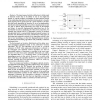Free Online Productivity Tools
i2Speak
i2Symbol
i2OCR
iTex2Img
iWeb2Print
iWeb2Shot
i2Type
iPdf2Split
iPdf2Merge
i2Bopomofo
i2Arabic
i2Style
i2Image
i2PDF
iLatex2Rtf
Sci2ools
132
click to vote
INFOCOM
2007
IEEE
2007
IEEE
Iterative Scheduling Algorithms
— The input-queued switch architecture is widely used in Internet routers due to its ability to run at very high line speeds. A central problem in designing an input-queued switch is the scheduling algorithm that decides which packets to transfer from ingress ports to egress ports in a given timeslot. It is desirable that such algorithms be iterative (so as to be pipelineable), distributed (allowing flexibility in hardware implementation) and are able to deliver high performance (in terms of throughput and delay). In practice, implementable algorithms have so far had limited success in combining all of the above properties. For example, the popular iSLIP [1] algorithm is known to perform suboptimally, but it is commercially deployed mainly because it is iterative and distributed. The main contribution of this paper is the design and systematic analysis of two algorithms which, to the best of our knowledge, are the first high-performance iterative and distributed scheduling algorith...
Algorithm | Communications | Distributed Scheduling Algorithm | INFOCOM 2007 | Scheduling Algorithm |
Related Content
| Added | 03 Jun 2010 |
| Updated | 03 Jun 2010 |
| Type | Conference |
| Year | 2007 |
| Where | INFOCOM |
| Authors | Mohsen Bayati, Balaji Prabhakar, Devavrat Shah, Mayank Sharma |
Comments (0)

